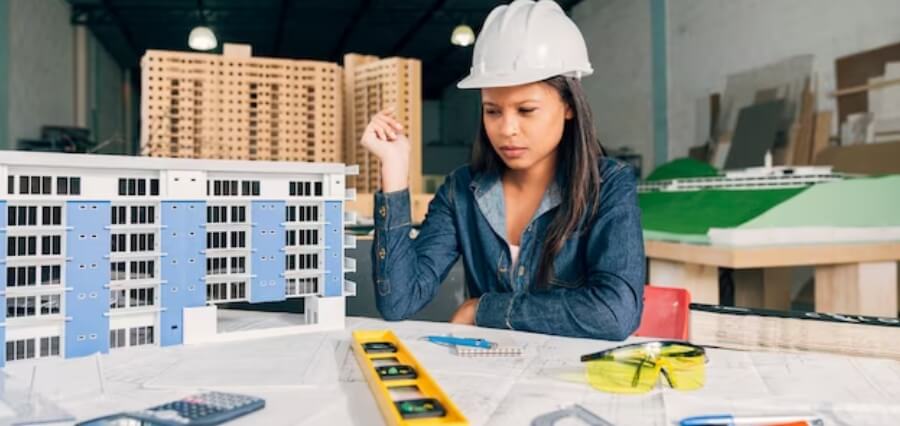When it comes to running a successful construction business, you’ll need to do more than just deliver quality projects. This business demands effective cost management to ensure profitability and sustainability.
According to Upmetrics, starting a construction company in the US will cost you between $53,100 and $245,200. Factors like the cost of raw materials, equipment, and rent factor heavily influence these costs. As your construction business grows, so will the costs, and you need to find ways to keep these costs under control. At times, you’ll often need to find ways to reduce the costs in general.
Again, according to Statista, the US construction market was valued at around $1.8 trillion in 2022. In this competitive construction industry, businesses must continually seek ways to optimize expenses without compromising on safety, quality, or efficiency.
That being said, here are a few strategic cost-reduction tips that can help your construction business thrive in a challenging economic landscape.
#1 Sustainable Construction Practices
Sustainability isn’t just a buzzword; it’s a cost-effective strategy for modern construction businesses. Embracing sustainable practices can lead to long-term cost reductions by minimizing waste, reducing energy consumption, and enhancing overall efficiency.
Moreover, sustainable construction practices often align with regulatory requirements and can open doors to government incentives, tax credits, and certifications. These may further reduce costs and improve your business’s market positioning.
#2 Rent Necessary Equipment Instead of Buying
Renting equipment is a smart strategy for construction businesses seeking cost-effective and flexible solutions. Instead of purchasing heavy equipment, tools, machinery, or vehicles, renting allows for immediate access to the required equipment without long-term financial commitment.
This approach is particularly advantageous for projects with fluctuating equipment needs or short durations. Renting construction equipment from Aerzen Rental Services also eliminates maintenance costs, as the rental provider typically handles upkeep and repairs.
According to SitePro Rentals, you can rent machines and equipment like trailers, generators, diggers, work platforms, and other costly but necessary equipment. If you’re looking to buy these things, you will have to spend hundreds of thousands of dollars. However, when you rent them, you only have to spend a few hundred or thousand dollars every day.
For a startup construction business, this is the ideal way to save money. Construction equipment renting businesses have all the necessary machinery and tools you need to get your business off the ground. You can click here to see what kind of other heavy equipment you can rent from these companies.
#3 Optimize Workforce Management
Labor costs often constitute a significant portion of construction expenses. Efficient workforce management is crucial for optimizing costs without compromising the quality of work.
Implementing strategic workforce planning, cross-training employees, and investing in employee development can enhance flexibility and productivity. Consider leveraging technology to monitor and manage labor resources effectively. Time-tracking software, for instance, can provide valuable insights into employee productivity, helping identify areas for improvement or potential inefficiencies.
Furthermore, investing in employee satisfaction and well-being can lead to increased productivity and decreased turnover rates. Happy and engaged employees are more likely to stay with the company, reducing recruitment and training costs associated with high turnover.
#4 Robust Risk Management
Construction projects are inherently prone to various risks, ranging from unforeseen weather events to changes in regulatory requirements. Implementing a robust risk management strategy is essential for mitigating potential financial setbacks and ensuring project success.
Thoroughly assess and identify potential risks at the outset of a project. This includes analyzing the local regulatory environment, weather patterns, and geopolitical factors that may impact construction timelines and costs.
For instance, according to The Guardian, the UK economy shrunk by 0.5 percent in July 2023 due to bad weather conditions and strikes. This, in turn, affected the construction industry directly as the market dipped by 0.5 percent that month. Thus, you must develop contingency plans and allocate budget reserves for unforeseen circumstances like these. Regularly revisit and update risk assessments throughout the project lifecycle to adapt to changing conditions.
Being proactive in risk management can prevent costly delays and budget overruns, ultimately contributing to significant cost reductions.
#5 Lean Construction Principles
Embracing lean construction principles can transform the efficiency and cost-effectiveness of your construction projects. Implementing lean practices involves continuous improvement, collaborative planning, and a commitment to delivering projects on time and within budget.
Lean construction principles also emphasize the importance of open communication and collaboration among all stakeholders, from designers to contractors and subcontractors. By fostering a culture of collaboration, your construction business can achieve greater transparency and efficiency, leading to substantial cost reductions and improved project outcomes.
In conclusion, when it comes to the construction industry, strategic cost reduction is a critical factor for business success. Sticking to the tips above will help your construction business achieve significant cost savings without compromising quality or safety. As the industry continues to evolve, businesses that prioritize cost-effectiveness and efficiency will not only survive but thrive in the dynamic construction market.


